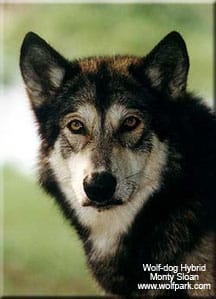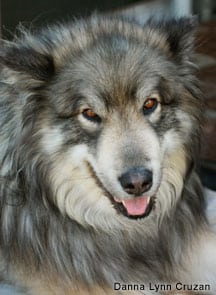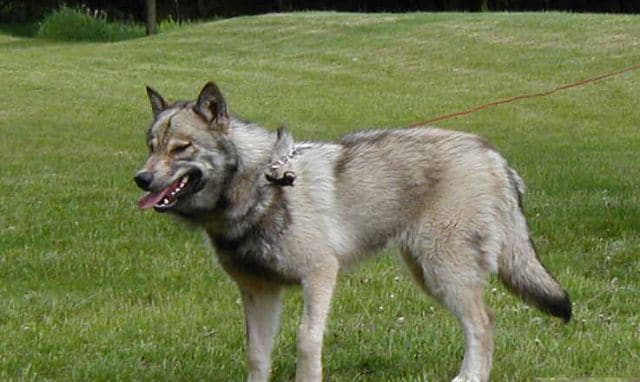Wolf and wolf-dog hybrid ownership by private citizens has long been a contentious issue in the United States.
 Wolf-dog hybrid (hybrid for short) is a term used to describe an animal that is part wolf and part domestic dog. Dogs (Canis lupus familiaris) and wolves (Canis lupus) share an evolutionary past and thus share many physical and behavioral traits.
Wolf-dog hybrid (hybrid for short) is a term used to describe an animal that is part wolf and part domestic dog. Dogs (Canis lupus familiaris) and wolves (Canis lupus) share an evolutionary past and thus share many physical and behavioral traits.
Dogs evolved from wolves through a centuries-long process of domestication. Domestication is the process by which a wild animal adapts to living with humans by being selectively bred by humans over thousands of years. Through this process, a dog’s behavior, life cycle and physiology have become permanently altered from that of a wolf.
Wolves and dogs are interfertile, meaning they can breed and produce viable offspring. In other words, wolves can interbreed with any type of dog, and their offspring are capable of producing offspring themselves. Although hybrids can occur naturally in the wild, they are rare because the territorial nature of wolves leads them to protect their home ranges from intruding canines such as dogs, coyotes and other wolves.
Governed by their instincts, wolves, both in the wild and in captivity, exhibit behavior that is relatively consistent. Their behavioral characteristics have been studied and observed for many decades by researchers, and much has been published about their social dynamics, hunting behavior and territorial nature. Thanks to the researchers’ hard work, we are able to understand the wolf’s reactions to different situations based on their inherent instincts. However, just as with any wild animal, their behavior will always retain some unpredictability.
People who own hybrids often find that their pet’s behavior makes it a challenge to care for. The diversity of genetic composition even within one litter of hybrid pups leads to a wide range of appearances and behavior patterns among all hybrids, thus making their behavior inconsistent and more difficult to predict.
Wolves and dogs mature at different rates, which makes the physical and mental development of a hybrid animal unpredictable. Sexual maturity of wolves signals a shift in hormone quantity and balance. This hormonal change is often coupled with behavioral changes in the animal.
When a wolf reaches sexual maturity (anywhere from 1 to 4 years of age), their role in the pack often changes from that of a pup to an adult expected to contribute to the pack. Status becomes much more important, and the animal may begin testing its packmates to achieve a higher-ranking position in the pack. Testing or challenging of packmates can be transferred onto a human “leader” when a wolf is kept in captivity, causing the animal to be perceived as stubborn, bold or even aggressive.
Domestic dogs tend to mature much earlier (6 to 8 months of age) and have significantly fewer hormonal changes, but the challenging behavior still exists, although it is typically less intense in most breeds compared to wolves. Hybrids can exhibit any combination of wolf or dog maturation rates and behavioral changes.
Additionally, the territorial instinct of wolves to protect their food source by establishing a home range through defecation and urination may be transferred to the owner’s home. A couch or corner of the room may take the place of a tree or rock. Dogs, on the other hand, through domestication, have lost that instinct to urinate or defecate anywhere they feel is their territory and are easily trained to eliminate in a designated area.
Hybrids, being a mix of these two distinct behavior patterns, may have any degree of territorial or testing behavior-from one end of the spectrum to the other.
Whether or not hybrids make good pets is perhaps the biggest contention. Some people have outstanding success with hybrids as pets so to make a blanket statement is difficult. The reality is that there is an animal with a genetic stew that includes contributions from a line of dogs that has been domesticated over the centuries compiled with a contribution of an animal that has not.
Wolves are social by nature and demand a great amount of attention and interaction from their pack. This expectation translates onto the owner when a wolf is kept in captivity. Often, potential hybrid owners overlook the important task of understanding the nature of the wild wolf and the domestic dog and become overwhelmed when their “pet” begins to show behavioral traits that are unexpected and unmanageable.
One organization educating the public about the issues of wolf and hybrid ownership is Wolf Park. Wolf Park explains that while many individuals do make an effort to become educated about the potential outcome of owning a wolf or hybrid, others unfortunately do not. This results in the animals being kept in an environment where their social and behavioral needs are not met. In these situations, the animals frequently spend their days in small cages or tied to chains, with very poor quality of life.
When any animal, wild or domestic, is kept in conditions inadequate to their mental and physical needs, there is a safety risk for humans. This risk is almost always preventable through proper preparation before the animal is purchased and continued through responsible care for the animal over the duration of its life.
Every year, thousands of pet wolves or hybrids are abandoned, rescued or euthanized because people purchase an animal they were not prepared to care for. A few facilities exist around the country that take in unwanted canines, but their resources are usually very limited. Education about the behavior, health and containment of wolves and hybrids and about laws pertinent to their ownership before people buy may prevent hardships for both human and animal.
MYTHS REGARDING WOLF HYBRIDS
MYTH: A wolf hybrid will make a better guard dog.
FACT: Due to the shy nature of wolves, hybrids usually make poor protection dogs. Aggressive tendencies, if any, in the hybrid may be fear induced and as such, can be unpredictable and hard to control.
MYTH: A wolf hybrid will live longer than a dog.
FACT: The life span of a wolf in captivity is 12-14 years – the same as a large domestic dog.
MYTH: Hybrids are healthier than dogs, and are less prone to disease.
FACT: Wolves and dogs are prone to the same infectious diseases. There may be some question as to the efficacy of standard dog vaccines in wolves and some hybrids.
MYTH: Huskies and malamutes are part wolf.
FACT: Huskies and malamutes are breeds of dogs, like any other.
WOLF CONTENT IN THE HYBRID
 Many breeders who deal in wolf hybrids promote the ‘wolf content’ of the pups and even set their prices according to the ‘amount of wolf blood’ in the litter. This is not based on sound biology or genetics.
Many breeders who deal in wolf hybrids promote the ‘wolf content’ of the pups and even set their prices according to the ‘amount of wolf blood’ in the litter. This is not based on sound biology or genetics.
When one breeds a dog with a wolf, the offspring will inherit a set of genes from each parent, and are indeed 50/50 – that is, one-half dog and one-half wolf. However, when these animals are bred with other 50/50 hybrids, there is no way to calculate or manipulate which genes are passed to the offspring. As a result, these offspring may inherit a majority of dog genes from both parents and would therefore be predominantly dog – both physically and behaviorally. Or conversely, they could be predominantly wolf, or any variation or combination in between. The ideal wolf hybrid would be one that looks like a wolf and behaves like a dog, but unfortunately, many times one ends up with an animal that looks like a dog and has the perceived “obstinate” nature of a wolf.
LEGAL ASPECTS OF WOLF HYBRID OWNERSHIP
Laws vary from area to area. In some states, hybrids are classified as wild animals and owners are required to possess the same type of permits and caging as for a wolf. In other states, hybrids are regulated as dogs, needing only proper vaccinations and licenses.
ADDITIONAL RESOURCES
Between Wolf and Dog by Jessica Addams and Andrew Miller
America’s Other Controversial Canine, The Wolf Hybrid by Monty Sloan
Prendergast, Dorothy. The Wolf Hybrid. Gallup, NM: Rudelhaus Enterprise, 1989. 141 pp.
The Wolf Dunn, an online resource for information on wolf/dog hybrids.Wolfdog ownership laws by state (A non-regulated, privately run Web site)
http://www.wolf.org/learn/basic-wolf-info/wolves-and-humans/wolf-do...
Tags:
Replies to This Discussion
-
Permalink Reply by Red Wolf on October 15, 2014 at 7:55am
-
Yesterday i had the honor of meeting my first white Hybrid wolf name Snowy. A pure white timber wolf mixed with saymona . Her eyes were as blue as the sky and her fur thick and pure white not a mark of black on her. I could not get over Snowy eyes. Her muzzle was long and her tail beautiful.
She was amazing. here in AZ. only the Indian can have wolves but she slip through the ropes.
-
-
Permalink Reply by SunKat on October 15, 2014 at 8:13am
-
I have never had the pleasure of meeting one up close and personal however I have known more than one person who owned one or more and I hear it changes you - it's an incredible experience. Wow I did not know that about Arizona and what a shame but perhaps that's for a good reason? If you do consider ownership be safe :)
-
-
Permalink Reply by Tuffy on October 15, 2014 at 8:06am
-
That is an interesting point do we reverse the role of wolf/dog evolution but i still think if your going to own the hybrid allow allowances for there pack instincts even if its territory in the house or yard , even there own little couch as they mature, but it still comes down to the owner I think and what they are willing to do in the animals upbringing which can allow for there needs
-
-
Permalink Reply by SunKat on October 15, 2014 at 8:15am
-
Crossed with a dog or not that wild pack instinct will always be there and may show at any time. Regular exercise will help a lot with how aggressive they can be I would think. I know one lady who owns 2 and they have really become her life. She is always on the move with them.
-
Have questions?
Need help? Visit our Support Group for help from our friendly Admins and members!
Have you?
Donations & Sponsorship
Connect
Visit The Temple
on Facebook:
Blog Posts
Channeled Angelic Wisdom of the Jewels of Truth Series on Beneficence and Heaven on Earth
Posted by Atrayo on April 17, 2024 at 10:26am 0 Comments 1 Like
Channeled Angelic Wisdom of the Jewels of Truth Series on Unconditional Truth and Free Will
Posted by Atrayo on April 14, 2024 at 7:54am 0 Comments 1 Like
Channeled Angelic Wisdom of the Jewels of Truth Series on The Afterlife, God, & World Peace
Posted by Atrayo on April 6, 2024 at 1:51pm 0 Comments 1 Like
coat of arms of McIntyre clan.
Posted by Ghillie Dhu on March 2, 2024 at 5:06am 4 Comments 0 Likes
Channeled Angelic Wisdom of the Jewels of Truth Series on Destiny, Future Past, and Meta-Genesis
Posted by Atrayo on February 22, 2024 at 12:54am 0 Comments 1 Like
Channeled Angelic Wisdom of the Jewels of Truth Series on Sex Addicts and Jealousy
Posted by Atrayo on February 14, 2024 at 6:57pm 0 Comments 1 Like
Are Ouija Boards Evil?
Posted by Bill Walker on February 1, 2024 at 8:15pm 1 Comment 1 Like
PAGAN GLBTQ Pansexual/Hetero ADULT QUANTUM ECLECTIC BOOK LIST - PARTS 1 & 2 - 2024
Posted by Sky a.k.a. JD Aeon on January 7, 2024 at 4:43am 1 Comment 5 Likes
Channeled Angelic Wisdom of the Jewels of Truth Series on The True Sons and Daughters of God, Decision Making, God, and Majesty of Being
Posted by Atrayo on December 29, 2023 at 1:04pm 0 Comments 1 Like
TO RISE AND FIGHT AGAIN
Posted by Kitt on December 14, 2023 at 8:55pm 2 Comments 4 Likes
Channeled Angelic Wisdom of the Jewels of Truth Series on Spiritual Modesty, Exalted, Glories of God, & Grace
Posted by Atrayo on November 29, 2023 at 11:21pm 0 Comments 2 Likes
Osiris the Warlock: The Cursed
Posted by 06iiris on October 13, 2023 at 8:30am 0 Comments 1 Like
Osiris the Warlock: Horus Lives!
Posted by 06iiris on October 13, 2023 at 7:00am 0 Comments 0 Likes
Osiris the Warlock: Nanna-Sin
Posted by 06iiris on October 12, 2023 at 3:30pm 0 Comments 0 Likes
Osiris the Warlock: Daemon
Posted by 06iiris on October 12, 2023 at 6:00am 0 Comments 0 Likes
Osiris the Warlock
Posted by 06iiris on October 12, 2023 at 5:30am 0 Comments 0 Likes
The (3l)ack & Red Dragon
Posted by 06iiris on October 11, 2023 at 1:00pm 0 Comments 0 Likes
The Sin (3l)ood Omen (II)
Posted by 06iiris on October 11, 2023 at 8:30am 0 Comments 0 Likes
The Sin (3l)ood Omen
Posted by 06iiris on October 9, 2023 at 7:30am 0 Comments 0 Likes
The 3nki (Doc)trine: Ptah-Øsiris
Posted by 06iiris on October 5, 2023 at 1:00pm 0 Comments 0 Likes
NOVEMBER AWARENESS
Videos
-
Two Become One
Added by Imelda James 0 Comments 0 Likes
-
You and I Love
Added by Imelda James 0 Comments 0 Likes
-
Deuce - America
Added by Bryan_Thoth 0 Comments 0 Likes
© 2024 Created by Bryan
Powered by
![]()
